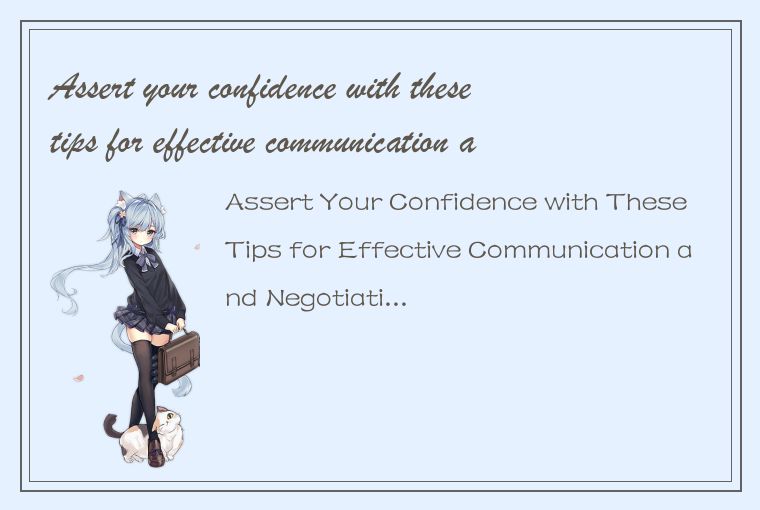Assert Your Confidence with These Tips for Effective Communication and Negotiation

Asserting communication and negotiation skills is an essential facet of professional and personal lifestyles. Effective communication and negotiation skills not only help us establish effective relationships but also allow us to express our opinions and ideas with clarity and confidence. Successful communication and negotiation skills are critical in business, workplace settings, and day-to-day life. In this article, we will discuss how to assert your confidence with effective communication and negotiation skills.
Understand the Basics of Communication and Negotiation
Communication is a two-way process of conveying ideas, thoughts, emotions, and information through verbal, nonverbal, and written means to others. Negotiation, on the other hand, is a process of bargaining or agreeing to terms between individuals or groups to reach an outcome acceptable to all parties. Understanding the basics of communication and negotiation is critical to building effective and assertive communication skills.
To communicate with assertiveness, it is essential, to begin with, an understanding of your audience. Paying attention to the receiver's body language, tone, and feelings can provide valuable insight into their perspective. Listening carefully to others and processing the information they provide are essential tools in effective communication. You should also be confident in what you are saying and be able to articulate your opinions, thoughts, and ideas with clarity and assertiveness.
Develop Empathy and Emotional Intelligence
Empathy and emotional intelligence are two vital components of effective communication and negotiation. Empathy is the capacity to understand and share the feelings of others, while emotional intelligence is the ability to manage your own emotions and those of others effectively. To negotiate with confidence, you need to be able to understand the other party's point of view and use empathy to build rapport and establish trust.
Developing empathy and emotional intelligence can help you anticipate the other party's needs and interests, allowing you to communicate effectively and negotiate a mutually beneficial outcome. Empathy can also help you identify potential conflicts or misunderstandings and address them before they escalate. Emotional intelligence, on the other hand, can help you manage and control your emotions effectively, enabling you to communicate with assertiveness and confidence.
Use Effective Body Language and Tone of Voice
Body language is an essential aspect of communication and negotiation. Your body language can convey confidence, assertiveness, and openness, or it can convey nervousness, uncertainty, and lack of confidence. To communicate with assertiveness, you should use positive, open body language and maintain eye contact with the other party.
Your tone of voice is also critical in communication and negotiation. Speaking too quickly, too loudly, or using a monotone voice can convey aggression, impatience or nervousness. Using a calm and confident tone can help you assert your confidence and communicate effectively.
Develop Active Listening Skills
Active listening is a critical aspect of effective communication and negotiation skills. Active listening involves paying attention to the speaker, understanding their perspective, and responding appropriately. Active listening skills are essential in a negotiation setting, as they enable you to understand the other party's needs and interests while conveying your own.
To develop active listening skills, you should avoid interrupting the speaker, ask clarifying questions, and repeat what they have said in your own words to ensure you understand their perspective accurately.
Prepare and Practice
The key to developing confidence in communication and negotiation skills is preparation and practice. Before a meeting or negotiation, you should research the other party, understand their goals and interests, and develop a strategy for achieving a mutually beneficial outcome. You should also prepare for potential objections or challenges and develop a plan for addressing them.
Practice is also essential in developing effective communication and negotiation skills. Practice speaking in front of a mirror or recording yourself to identify areas for improvement. Role-play negotiation scenarios with a friend or mentor to gain confidence and refine your communication and negotiation strategy.
Conclusion
Asserting confidence in communication and negotiation skills is critical in building effective relationships, expressing opinions, and achieving success in personal and professional settings. Understanding the basics of communication and negotiation, developing empathy and emotional intelligence, using effective body language and tone of voice, developing active listening skills, and preparation and practice are essential components in developing assertive communication and negotiation skills. By practicing these tips and strategies, you can assert your confidence and negotiate with success in any setting.




 QQ客服专员
QQ客服专员 电话客服专员
电话客服专员